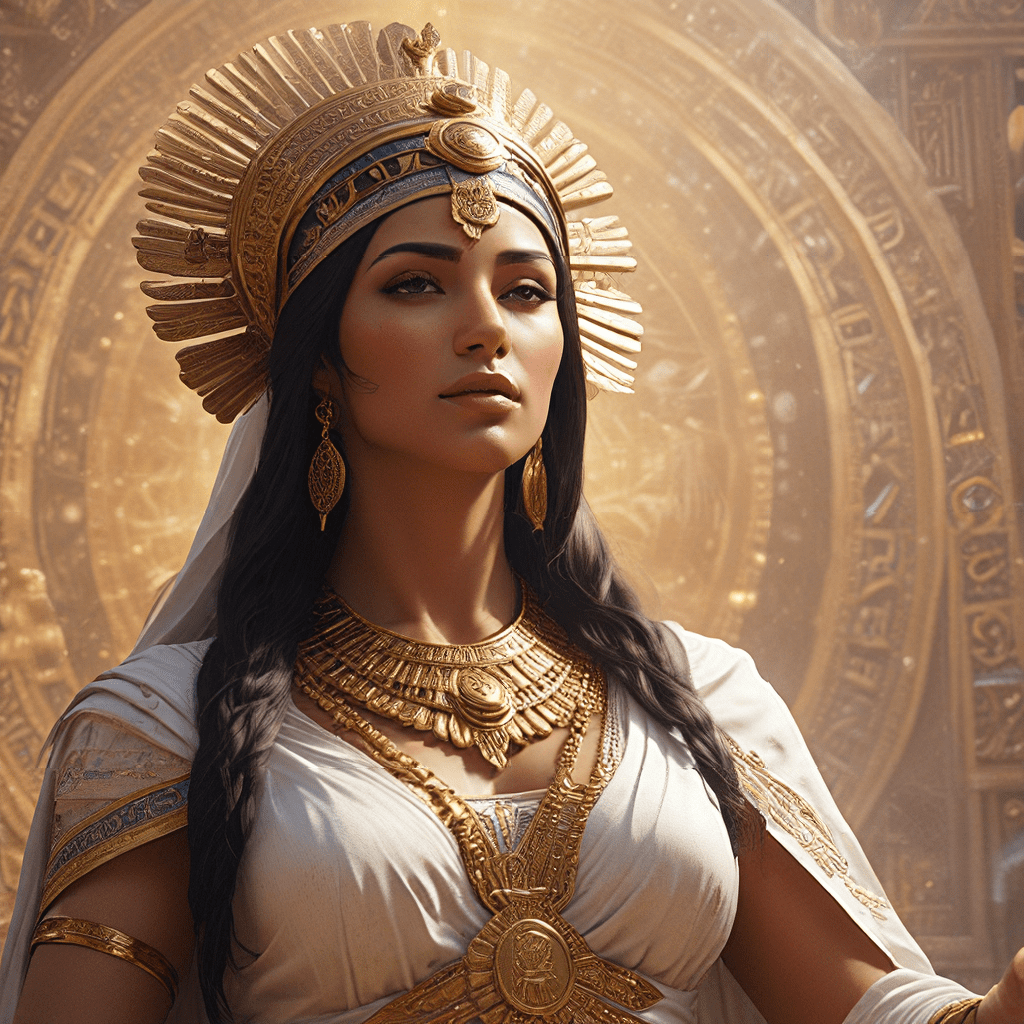1. Introduction: Isis, the Enchantress of the Nile
Isis, the goddess of magic, healing, and motherhood, holds a prominent place in ancient Egyptian mythology. Her name, meaning “throne,” reflects her powerful position as a divine queen and protector. Isis was a symbol of life, fertility, and the cyclical nature of existence, making her one of the most beloved and revered goddesses in ancient Egypt.
She was not only a powerful force in the cosmos but also a nurturing mother figure who embodied the feminine aspect of the divine. Her influence extended beyond the realm of myth, deeply impacting ancient Egyptian customs, rituals, and beliefs. Isis’s legacy continues to inspire and fascinate people today, making her a timeless icon of feminine power and resilience.
2. Origins and Family: From Cosmic Beginnings to Royal Lineage
Isis, the daughter of Nut (sky goddess) and Geb (earth god), was born from the union of the heavens and the earth. Her siblings included Osiris, the god of the underworld, Set, the god of chaos, Nephthys, and Horus, her son. This divine family played a crucial role in Egyptian mythology, embodying the forces that shaped the cosmos.
The relationships within the family were complex and often fraught with conflict. Set’s jealousy of his brother Osiris led to a tragic act of murder, setting in motion a series of events that would redefine the nature of life and death in Egyptian mythology. Isis’s role as a loyal sister and devoted mother propelled her into the heart of this epic drama, demonstrating her strength and unwavering commitment to restoring balance and justice.
3. Isis, the Protector and Healer: Nurturing Life and Restoring Balance
Isis was renowned for her healing abilities, especially in matters of childbirth and fertility. She was often depicted carrying a magical sistrum, a musical instrument believed to have healing powers. Ancient Egyptians believed that she could cure diseases, restore health, and even bring the dead back to life. Her association with the lotus flower, a symbol of rebirth and renewal, reinforces her connection to the regenerative forces of nature.
Her role as a protector and healer extended beyond the physical. Isis was also believed to offer spiritual guidance and solace to those in need. She was a source of comfort during times of hardship and offered hope for a brighter future. Her unwavering devotion to her loved ones and her tireless efforts to heal the wounds of the world made her a symbol of compassion, empathy, and unwavering love.
4. The Myth of Osiris and Isis: Love, Loss, and the Triumph of the Divine
The story of Osiris and Isis is one of the most powerful and enduring narratives in ancient Egyptian mythology. After the murder of Osiris by his jealous brother Set, Isis embarked on a perilous journey to retrieve her husband’s body. She faced many challenges and dangers along the way, demonstrating her courage, strength, and determination.
Through her magical powers, Isis resurrected Osiris, giving him enough life to conceive their son, Horus. This act of resurrection, a powerful symbol of hope and renewal, solidified Isis’s role as a bringer of life and a defender of the divine order. Despite the tragedy of Osiris’s death, Isis’s unwavering love and resilience ultimately triumphed, restoring balance and perpetuating the cycle of life and death. The birth of Horus, who later avenged his father’s death and ascended to the throne as the god of kingship, represented the triumph of good over evil and the cyclical nature of life.
5. Isis, the Enchantress: Magic, Wisdom, and the Power of Knowledge
Isis was considered a master of magic and a powerful sorceress. Her knowledge of herbs, potions, and rituals gave her the ability to control the forces of nature and manipulate destiny. She was known for her cunning and her ability to outwit her enemies, using her magical powers to protect herself and her loved ones.
The ancient Egyptians believed that Isis’s magic was a reflection of her wisdom and her deep connection to the divine. She was a symbol of the power of knowledge and the ability to use it for good. Her magical abilities were not simply tools for personal gain, but rather a way to restore balance, heal the sick, and protect the innocent. This dedication to using her powers for the greater good made her a role model for aspiring magicians and healers in ancient Egypt.
6. Isis as a Symbol of Motherhood and Female Power: Embracing the Divine Feminine
Isis’s role as a mother, protector, and healer made her a powerful symbol for women in ancient Egypt. She represented the nurturing and protective aspects of motherhood, as well as the strength and resilience of the feminine spirit. Her unwavering love and devotion to her family, her ability to overcome adversity, and her commitment to justice made her an inspiring role model for women throughout history.
Isis’s enduring popularity as a goddess reflects the power and importance of the feminine divine. She challenged traditional notions of power and demonstrated that women could be strong, resilient, and capable of leading with compassion and wisdom. Isis’s legacy continues to empower women today, reminding them of their inherent strength and their potential to create a better world. Her story is a testament to the enduring power of the feminine spirit and its ability to shape the course of history.




